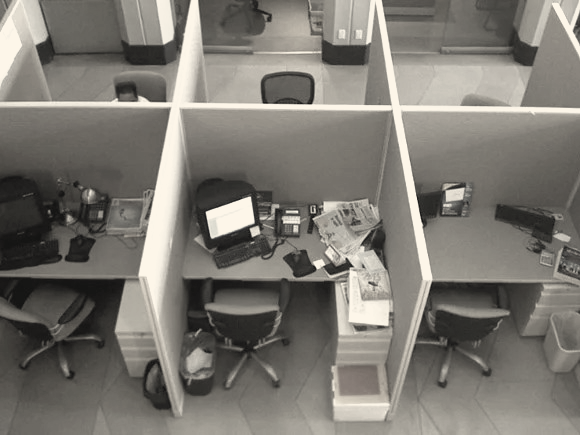In the previous post of this series, as a product of an (internship) experience, I mentioned a couple of paradoxical aspects of history museums. Since most of the museum work takes place in the office, I would now like to make a shift towards this dubious site. To be more specific, I am interested in how office work/life shapes human interactions, habits, understanding, routine, and most importantly, the self. In this post, I will look into the most fundamental aspect of usual office work; that is the constant interplay between the agent and the computer.
Imagine a factory worker in the early 19th century. The way the present eye usually conceives of the automated tasks the factory worker did is condescending. The repeated tasks are now replaced with various machines that not only do the job better, but are more ‘efficient’, in a pragmatic sense. Hence, from a Marxist point of view, if we were to time travel and observe how the worker exchanges a third to a half of his/her day of repeated labor in order to be able survive in the remaining part of the day, we would be compelled to invoke phrases such as alienation, oppression by the wealthy, in-humaneness, etc. However, fast-forwarding a couple centuries, we have not automated the nature of repeated mundane tasks. Mundane tasks have only switched location, that is from factories to offices. Unlike a modernist’s view, which believes that time is a linear line in which we progress as we head forwards, as technology attempts to “unchain” us from humdrum routine of daily work, we are still susceptible to such tasks in different forms.
To further elaborate, manipulation of excel cells, filling of forms, sending of emails, updating of online material, archiving of digital information, creation of databases, etc. can all be automated even now. When that is the case, i,e when one sees that the work he/she does has no value (if we are to evaluate value by the contribution of the worker to the doing of the task), then one is tempted to step towards an existential questioning: “What is the value of my work and day?“. Although such a questioning may not be explicit, I believe that the way people rush towards different forms of entertainment in non-working hours signal to me many people’s willingness in trying to stay unconscious of the banal reality built by the capitalist mentality. When a mouse and a keyboard are embodied and become more functional to the person than his/her legs that are idle under the desk, and when your desktop becomes more familiar to you than the faces of your spouse and kids (comparing the times seeing them throughout the day), I believe we are far from progress. Unless, accelerating and rolling down a steep is considered a progress just because we are rolling and accumulating more speed as we do so.
